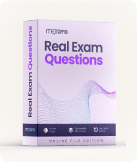Test Prep CPA Auditing and Attestation - Auditing and Attestation Exam
Page: 1 / 205
Total 1025 questions
Question #1 (Topic: Volume A)
Several sources of GAAP consulted by an auditor are in conflict as to the application of an accounting principle. Which of the following should the auditor consider
the most authoritative?
the most authoritative?
A. FASB Technical Bulletins.
B. AICPA Accounting Interpretations.
C. FASB Statements of Financial Accounting Concepts.
D. AICPA Technical Practice Aids.
Answer: A
Question #2 (Topic: Volume A)
For an entity's financial statements to be presented fairly in conformity with generally accepted accounting principles, the principles selected should:
A. Be applied on a basis consistent with those followed in the prior year.
B. Be approved by the Auditing Standards Board or the appropriate industry subcommittee.
C. Reflect transactions in a manner that presents the financial statements within a range of acceptable limits.
D. Match the principles used by most other entities within the entity's particular industry.
Answer: C
Question #3 (Topic: Volume A)
Which of the following statements is correct concerning an auditor's responsibilities regarding financial statements?
A. An auditor may not draft an entity's financial statements based on information from management's accounting system.
B. The adoption of sound accounting policies is an implicit part of an auditor's responsibilities.
C. An auditor's responsibilities for audited financial statements are confined to the expression of the auditor's opinion.
D. Making suggestions that are adopted about an entity's internal control environment impairs an auditor's independence.
Answer: C
Question #4 (Topic: Volume A)
Which of the following provides the most authoritative guidance for an auditor?
A. An AICPA audit and accounting guide that provides specific guidance with respect to the accounting practices in the client's industry.
B. A Journal of Accountancy article discussing implementation of a new standard.
C. General guidance provided by a Statement on Auditing Standards.
D. Specific guidance provided by an interpretation of a Statement on Auditing Standards.
Answer: C
Question #5 (Topic: Volume A)
Which of the following accurately depicts the auditor's responsibility with respect to Statements on Auditing Standards?
A. The auditor is required to follow the guidance provided by the Standards, without exception.
B. The auditor is generally required to follow the guidance provided by Standards with which he or she is familiar, but will not be held responsible for departing from provisions of which he or she was unaware.
C. The auditor is generally required to follow the guidance provided by the Standards, unless following such guidance would result in an audit that is not cost- effective.
D. The auditor is generally required to follow the guidance provided by the Standards, and should be able to justify any departures.
Answer: D
